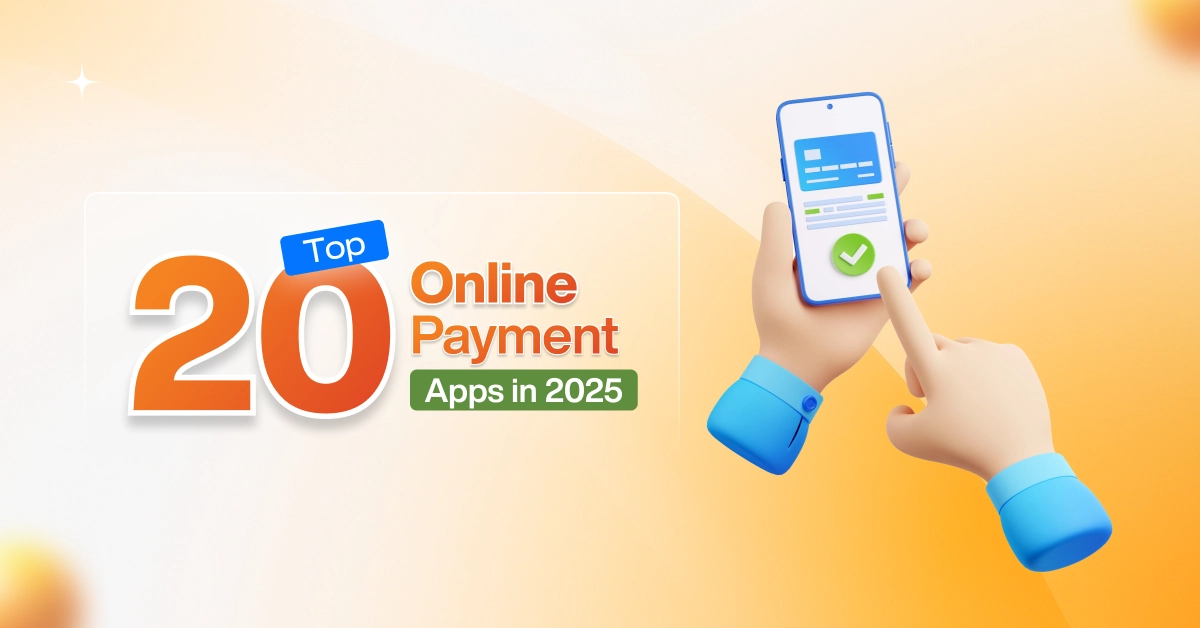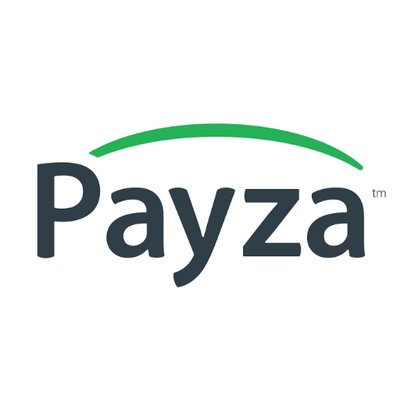
Last Updated on October 20, 2025
The internet has become the foundation of modern-day transactions. From small and freelancer-based businesses to large corporations, Shopify’s payment gateway and other online payment options ensure smooth money transfers and web-based shopping as well as subscription billing.
In the face of PayPal being a target for opposition, many online payment services now have higher-quality features, fewer costs, and more accessibility.
In this article, we’ll review the top 20 internet-based payment options in 2025, providing their pros and cons, features, and reasons they are different. You can choose to be an individual or an enterprise looking for the best method to transfer or get funds; these apps offer a reliable.
Companies providing mobile app development services have increasingly integrated payment options into custom apps to make transactions even simpler for both businesses and customers alike.
Top 20 Online Payment Apps
1. Stripe
It is one of the top payment processors used by businesses as well as developers. Integrations and APIs make them the ideal solution for subscription services as well as online storefronts. The APIs’ powerful integrations provide the best solution for subscription or online store services.
- Best for: SaaS platforms and online stores.
- Key Feature: Subscription billing, global support, fraud detection, and customizable APIs.
- Pros: Advanced, streamlined design, and reliable for large companies.
- Cons: A complicated setup that is difficult for newbies.
2. Payoneer
Payoneer has been the top alternative for remote workers, freelancers, and businesses worldwide. Payoneer allows for easy trans-border transactions across multiple currencies.
- Best for: Freelancers, global payouts.
- Key Feature: Multi-currency accounts and prepaid Mastercard integrations with other platforms, such as Amazon, as well as Upwork.
- Pros: Quick global transfer and supports more than 150 currencies.
- Cons: Fees may be more expensive for withdrawals.

3. Wise (formerly TransferWise)
The Wise brand is renowned for its affordable international transfers, making it an ideal solution for businesses and private individuals handling cross-currency exchanges.
- Best for: International transfer.
- Key Features: The real exchange rate is available in multi-currency wallets and debit cards.
- Pros: Transparent charges and low cross-border transactions.
- Cons: Not ideal for high-risk businesses.
4. Square
Square offers a complete solution for small-scale businesses that includes point-of-sale (POS) solutions, web-based payment options, and tools for invoicing.
- Best for: Small businesses as well as retailers.
- Key Features: POS hardware, online store integration, and invoicing.
- Pros: Simple to use, ideal for small businesses in the area.
- Cons: More expensive fees on transactions made with cards.
5. Skrill
Skrill has been widely utilized to make transactions for business and personal use, as well as cryptocurrency transactions.
- Best for: Freelancers, crypto enthusiasts.
- Key Features: Crypto wallet, prepaid card, speedy transfer.
- Pros: Crypto support, quick global payment.
- Cons: Support for customers is often inefficient.

6. Google Pay
Google Pay is one of the most popular mobile wallets, which supports online, in-app, and contactless transactions.
- Best for: Android users.
- Key Features: contactless NFC transactions, peer-to-peer transfer, and integration into the Google ecosystem.
- Pros: Simple, secure, convenient.
- Cons: Not all products are available in certain nations.
7. Apple Pay
Apple Pay allows iPhone or Mac users to make payments online or in stores with confidence.
- Best for: iOS users.
- Key Features: Contactless payments, biometric security, and Apple platform integration.
- Pros: Highly secure, effortless on Apple devices.
- Cons: Not limited to the Apple ecosystem.
8. Venmo.
Venmo, which PayPal owns, is a social media payment service designed for quick transactions as well as bill splitting.
- Best For: peer-to-peer payments within the U.S.
- Key Features: Social payment feed, split bill, debit card.
- Pros: Simple to personalize, easily accepted.
- Cons: U.S.-only, not ideal for business.

9. Zelle
Zelle integrates directly with the major U.S. banks, making banking transfers from banks quick and simple.
- Best For: U.S. bank account holders.
- Key Features: instant transfers without fees and instant connections to bank apps.
- Pros: Speedy, no cost, and safe.
- Cons: U.S.-only, no buyer security.
10. Revolut
Revolut is a digital banking application that helps with global payments, multi-currency accounts, and cryptocurrency transactions.
- Best For: Travelers as well as global professionals.
- Key Features: Currency exchange, savings vaults, debit cards, and crypto assistance.
- Pros: Excellent to use internationally, feature-rich.
- Cons: Premium features require paid plans.
11. Cash App
The company is owned by Block (Square). The Cash App is widely used throughout the U.S. for P2P transfers as well as Bitcoin trading.
- Best For: U.S. users is for small transactions.
- Key Features: P2P transactions, Bitcoin trading, and stock investing.
- Pros: Free transfers and investment options.
- Cons: Limited global availability.

12. Amazon Pay
Amazon Pay lets users pay with Amazon Pay, which allows users to pay using their Amazon accounts, which makes shopping online easier and safer.
- Best For: Online shoppers.
- Key Features: One-click checkout, as well as fraud detection and integration to the Amazon ecosystem.
- Pros: A trusted brand, smooth checkout.
- Cons: They are mainly useful to retailers as well as Amazon buyers.
13. Samsung Pay
Samsung Pay combines NFC and MST technology to allow contactless payment across the globe.
- Best For: Samsung device users.
- Key Features: Contactless payment and reward programs.
- Pros: Wide acceptance, secure.
- Cons: Only available to Samsung smartphones.

14. WeChat Pay
A hit in China, WeChat Pay integrates payment directly into the WeChat app.
- Best For: Chinese market consumers.
- Key Features: QR code payment and integration into WeChat services.
- Pros: Highly loved in China.
- Cons: Not as extensive outside of China.
15. Alipay
Alipay, which is operated by Alibaba, is among the biggest mobile payment systems and is particularly popular in Asia.
- Best For: Companies that are targeting Asian clients from Asia.
- Key Features: QR code payments, buyer protection, and financial services.
- Pros: Huge user base, secure.
- Cons: Only available outside Asia.
16. Klarna
Klarna is famous for Klarna is famous for its “Buy Now, Pay Later” option that lets customers shop at their pace.
- Best For: Shoppers as well as e-commerce sites.
- Key Features: Installment payments with one-click checkout and security against fraud.
- Pros: Popular among e-commerce, Flexible payment choices.
- Cons: Not the best choice to use for personal transfers.
17. Worldpay
Worldpay is a world market leader in the field of payment processing, serving companies of all sizes.
- Best For: Enterprises, including larger ones.
- Key Features: Multi-channel payments, fraud prevention, and recurring billing.
- Pros: International reach, solid.
- Cons: Setting up is expensive.

18. Payza
Payza allows personal as well as business transactions and has global coverage.
- Best For: International payments.
- Key Features: E-wallet, prepaid card, and business solutions.
- Pros: Supports multiple currencies.
- Cons: It’s not as well-known as PayPal or Stripe.
19. Adyen
Adyen is a reliable payment service that’s used by companies such as Netflix, Spotify, and Uber. Best for: Global enterprises.
- Best for: Global enterprises.
- Key Features: Omnichannel payment, advanced fraud detection, and worldwide assistance.
- Pros: Enterprise-level and highly flexible.
- Cons: Complex for small-sized businesses.
20. Razorpay
Razorpay is an online payment service in India and is popular with both small and large businesses.
- Best For: Indian businesses and startups.
- Key Features: Payment gateways. Recurring billing, payment gateway, and APIs for developers.
- Pros: It supports Indian payment options and simple integration.
- Cons: Mostly India-focused.
Comparison Table of Top Payment Apps
| App | Best For | Pros | Cons |
| Stripe | Businesses & SaaS | Developer-friendly | Complex setup |
| Payoneer | Freelancers | Fast global payouts | High withdrawal fees |
| Wise | International transfers | Transparent fees | Not for high-risk biz |
| Square | Small businesses | POS integration | Higher fees per swipe |
| Skrill | Crypto & freelancers | Supports crypto | Slow support |
| Google Pay | Android users | Secure & simple | Limited availability |
| Apple Pay | iOS users | Secure, fast | Apple-only |
| Venmo | P2P in US | Social payments | US-only |
| Zelle | US bank users | Free & instant | No buyer protection |
| Revolut | Travelers | Multi-currency | Premium plans required |
| Cash App | US P2P | Free transfers | Limited globally |
| Amazon Pay | Shoppers | One-click checkout | Limited use |
| Samsung Pay | Samsung users | Wide acceptance | Device-limited |
| WeChat Pay | China | Popular locally | Limited abroad |
| Alipay | Asia | Huge user base | Limited outside Asia |
| Klarna | Shoppers | Flexible BNPL | Not for transfers |
| Worldpay | Enterprises | Reliable & global | Costly setup |
| Payza | Intl. users | Supports many currencies | Less popular |
| Adyen | Enterprises | Scalable | Complex setup |
Conclusion
Selecting an ideal payment app depends entirely upon your specific needs, whether they involve global transfers, easy POS integration, or enterprise solutions that ensure security and scalability.
From Stripe and Payoneer to Google Pay and Klarna, here is 2025’s collection of 20 online payment apps with something suitable for every need! As digital payments continue their exponential rise, ensuring transactions remain safe, swift, and effortless, check these 20 out today to stay ahead of digital payment trends and ensure smooth, safe transactions!

